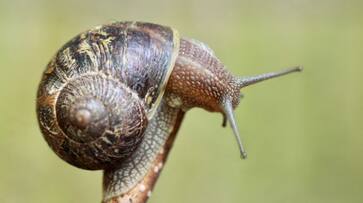African snails in Kottayam, Kerala, harm crops and health. Research and prevention efforts are tackling this serious issue.
In the rural areas of Kottayam, Kerala, African snails are causing significant problems. These large invaders, also known as giant African land snails, are multiplying quickly and eating crops and plants voraciously. They thrive in humid environments, making them hard to control once they settle in fields, marshlands, or even residential areas.
Farmers and homeowners are worried about the damage these snails can cause. They can destroy crops and gardens rapidly, posing a serious threat to agriculture. Besides, they carry diseases like meningitis, which is especially dangerous for children. The slime they produce to survive in humid conditions can also cause health issues.
Efforts are being made to understand and manage the growing snail population. Research centers like the Van Research Center in Peechi, Toyes in Kottayam, and the Department of Zoology at Cochin College are studying these snails closely. They advise residents to take precautions, such as washing vegetables thoroughly to remove any traces of snail slime and droppings. Boiling water before drinking it is also recommended to avoid contamination.
Managing snails involves using methods like spraying a mixture of tobacco and Thurish where snails are found. Sprinkling salt over this solution helps control them effectively. Preventative measures include avoiding organic waste buildup, trimming moist areas, and aerating soil after the rainy season to disrupt their habitats. Some people find that spreading black pepper can discourage snails from settling in gardens.
Overall, dealing with African snails requires vigilance and proactive steps to protect crops, gardens, and health in the affected areas of Kottayam.
Last Updated Jul 12, 2024, 4:31 PM IST









![Salman Khan sets stage on fire for Anant Ambani, Radhika Merchant pre-wedding festivities [WATCH] ATG](https://static-gi.asianetnews.com/images/01hr1hh8y86gvb4kbqgnyhc0w0/whatsapp-image-2024-03-03-at-12-24-37-pm_100x60xt.jpg)
![Pregnant Deepika Padukone dances with Ranveer Singh at Anant Ambani, Radhika Merchant pre-wedding bash [WATCH] ATG](https://static-gi.asianetnews.com/images/01hr1ffyd3nzqzgm6ba0k87vr8/whatsapp-image-2024-03-03-at-11-45-35-am_100x60xt.jpg)


